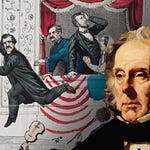Episode 01 - Solving the Paradox of Current World History
Episode 03 - The Venetian Takeover of England: A 200-Year Project
Episode 05 - Bestial British Intelligence Of Shelburne and Bentham
Episode 07 - Palmerston Launches Young Turks to Permanently Control the Middle East
Episode 09 - Jim Crow, a Cultural Weapon in the Hands of the Confederacy
🌐 Solving the Paradox of Current World History - In-depth Analysis
Solving the Paradox of Current World History examines historical methodology and the role of covert influence techniques in shaping world history. Spannaus’s work, grounded in the concepts of the Schiller Institute and Lyndon LaRouche’s theories, urges readers to understand history as a structured whole governed by deep, often contradictory forces rather than isolated events or simplistic narratives.
📜 Introduction: Purpose and Method
Solving the Paradox of Current World History by Nancy Spannaus seeks to explore how global events and ideological battles, often orchestrated by unseen forces, shape our understanding of history. Drawing on Plato’s “Parmenides” dialogue and LaRouche’s perspectives, the author advocates for a “method of strategic intelligence” that prioritizes understanding underlying systems of influence, focusing on “methodology” over pure data collection. Spannaus critiques superficial interpretations of history, encouraging a perspective that examines the hidden forces and guiding principles behind global power structures and decisions.
The Core Paradox: “One” and “Many” in History
The work engages with Plato’s concept of the “Parmenides paradox,” questioning how individual historical events (the “many”) can be understood within overarching, unifying forces (the “one”). This paradox challenges historians to consider how events and ideologies interconnect to form a comprehensive understanding of history.
Influence of British Intelligence: The “Multicultural Zoo”
Spannaus introduces the concept of “Lord Palmerston’s Multicultural Human Zoo,” a metaphor for British intelligence’s strategy of promoting controlled divisions within and among societies to maintain global influence. This tactic, she argues, leverages societal fractures and ideological conflicts, not through overt control but by subtly guiding outcomes through hidden channels and alliances. British intelligence thus serves as a model of a “discontinuity” system, where power is maintained by fostering divisions within rival factions rather than direct confrontation.
🧠 Core Themes and Concepts
1. Strategic Intelligence as Methodology
Spannaus stresses that true intelligence work must go beyond gathering facts to recognize interconnected, underlying strategies and philosophies driving global events. Facts alone, she argues, can obscure the forces that truly shape history unless viewed with a focus on systemic influence.
2. The Paradox of the “One” and the “Many”
Borrowing from Plato’s Parmenides, she explains that while individual events represent particular outcomes, true historical insight lies in understanding the abstract, unified forces behind them. This paradox implies that history’s driving forces often lie outside any specific moment or event.
3. British “Human Zoo” as a Model
In Lord Palmerston’s Multicultural Human Zoo, Spannaus presents British intelligence’s “divide and rule” strategy as an example of using engineered conflicts and multicultural ideologies to create strategic outcomes. This approach illustrates the system’s preference for covert influence over direct, overt intervention.
4. Avoiding Simplistic Narratives
Spannaus argues that historical intelligence requires avoiding binary “good vs. bad” narratives, which fail to capture the complexity of historical developments. Instead, a layered understanding of ideology and influence is required to see how powerful entities shape history.
5. Discontinuities as Power Tools
Discontinuities—seeming contradictions or breaks in historical continuity—are strategic points used to reframe power structures. Rather than resolving conflicts, these powers maintain influence by fostering divisions and steering outcomes without direct involvement.
6. Leibniz’s Philosophical Influence
A counterpoint to British tactics, Leibnizian philosophy emphasizes human creativity and progress, offering an alternative to the manipulation inherent in British strategies. The author suggests that understanding these philosophical foundations can serve as an intellectual defense against manipulative tactics.
7. Intelligence as Classical Drama
Spannaus likens the process of historical analysis to a classical drama, where events are interwoven scenes in a complex play. Understanding the “drama” of history requires analyzing the plot as a whole, focusing on themes rather than on individual “scenes.”
🕊 Conclusion: Implications for Historical Understanding
Spannaus’s exploration urges a deeper investigation into the paradoxical forces shaping history, warning against simplistic views. British intelligence, symbolized by the “Multicultural Zoo,” serves as an example of covert influence through engineered conflicts. This power, she argues, extends beyond individual actors to systemic ideologies and cultural beliefs, often maintaining influence by perpetuating discontinuities and divisions. Historical intelligence, Spannaus insists, requires engaging with the complexity of interwoven ideas rather than merely collecting facts. Through her work, she advocates a comprehensive, method-driven approach to understanding how ideologies, more than isolated events, influence the course of history.
Palmerston’s Zoo Series
For the past 30 years, media and academia have largely ignored the groundbreaking lectures presented at the President's Day 1994 Schiller Institute and International Caucus of Labor Committees conference. Yet, they contain some of the most vital historical insights for anyone seeking to understand the forces shaping today's world. "Palmerston's Zoo" is a deep exploration into the intricate workings of British imperialism—revealing the key figures, strategies, and philosophies behind its shadowy influence over global politics. This series brings together eight distinct but interwoven narratives that expose the power structures, manipulations, and covert operations that have determined the course of world history.
The Duke Report presents this podcast as an opportunity to breathe new life into these timeless analyses, giving listeners a comprehensive perspective connecting past imperial strategies and present-day geopolitics. The impact of these lectures is staggering, providing crucial context for understanding current events—a context that has never been widely disseminated through mainstream academic or media channels. The insights offered here are not just historical; they are the key to unlocking the deeper narrative of how global influence operates, making this possibly the most important history lesson for 21st-century humans. Join us on a journey that defies conventional narratives, challenges accepted truths and provides an essential map to navigate the complexities of modern power.
Links to authors and sources:
Let me know if anyone has been left out
Episode 01 - Solving the Paradox of Current World History
Episode 03 - The Venetian Takeover of England: A 200-Year Project
Episode 05 - Bestial British Intelligence Of Shelburne and Bentham
Episode 07 - Palmerston Launches Young Turks to Permanently Control the Middle East
Episode 09 - Jim Crow, a Cultural Weapon in the Hands of the Confederacy














Share this post